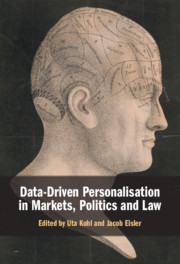Book contents
- Data-Driven Personalisation in Markets, Politics and Law
- Data-Driven Personalisation in Markets, Politics and Law
- Copyright page
- Contents
- Figures
- Tables
- Contributors
- Preface
- Part I Introduction: Theoretical Perspectives
- Part II Themes: Personal Autonomy, Market Choices and the Presumption of Innocence
- Part III Applications: From Personalised Medicine and Pricing to Political Micro-Targeting
- Part IV The Future of Personalisation: Algorithmic Foretelling and Its Limits
- 14 Regulating Algorithmic Assemblages: Looking beyond Corporatist AI Ethics
- 15 Scepticism about Big Data’s Predictive Power about Human Behaviour: Making a Case for Theory and Simplicity
- 16 Building Personalisation: Language and the Law
- 17 Conclusion: Balancing Data-Driven Personalisation and Law as Social Systems
- Index
15 - Scepticism about Big Data’s Predictive Power about Human Behaviour: Making a Case for Theory and Simplicity
from Part IV - The Future of Personalisation: Algorithmic Foretelling and Its Limits
Published online by Cambridge University Press: 09 July 2021
- Data-Driven Personalisation in Markets, Politics and Law
- Data-Driven Personalisation in Markets, Politics and Law
- Copyright page
- Contents
- Figures
- Tables
- Contributors
- Preface
- Part I Introduction: Theoretical Perspectives
- Part II Themes: Personal Autonomy, Market Choices and the Presumption of Innocence
- Part III Applications: From Personalised Medicine and Pricing to Political Micro-Targeting
- Part IV The Future of Personalisation: Algorithmic Foretelling and Its Limits
- 14 Regulating Algorithmic Assemblages: Looking beyond Corporatist AI Ethics
- 15 Scepticism about Big Data’s Predictive Power about Human Behaviour: Making a Case for Theory and Simplicity
- 16 Building Personalisation: Language and the Law
- 17 Conclusion: Balancing Data-Driven Personalisation and Law as Social Systems
- Index
Summary
A core claim of big-data-algorithm enthusiasts – producers, champions, consumers – is that big-data algorithms are able to deliver insightful and accurate predictions about human behaviour. This chapter challenges this claim. I make three contributions: First, I perform a conceptual analysis and argue that big-data analytics is by design a-theoretical and does not provide process-based explanations of human behaviour, making it unfit to support insight and deliberation, which is transparent to both legal experts and non-experts. Second, I review empirical evidence from dozens of data sets, which suggests that the predictive accuracy of mathematically sophisticated algorithms is not consistently higher than that of simple rules (rules that tap on available domain knowledge or observed human decision-making); rather, big-data algorithms are less accurate across a range of problems, including predicting election results and criminal profiling (this work presented here refer to understanding and predicting human behaviour in legal and regulatory contexts). Third, I synthesize the above points in order to conclude that simple, process-based, domain-grounded theories of human behaviour should be put forth as benchmarks, which big-data algorithms, if they are to be considered as tools for personalization, should match in terms of transparency and accuracy.
Information
- Type
- Chapter
- Information
- Data-Driven Personalisation in Markets, Politics and Law , pp. 263 - 276Publisher: Cambridge University PressPrint publication year: 2021
